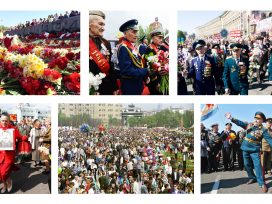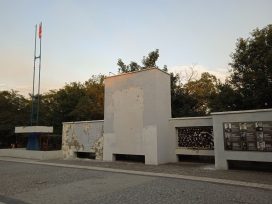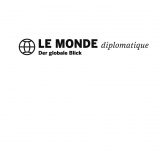Mischa Gabowitsch
Historian and sociologist, senior researcher at the Einstein Forum in Potsdam, Germany. His book publications include Protest in Putin’s Russia (2016) and Replicating Atonement: Foreign Models in the Commemoration of Atrocities (2017), as well as a number of edited volumes on war memory and commemoration. He is currently writing a history of Soviet war memorials.
Articles

Varieties of antifascism
Russian notes towards a global debate
Controversies over whether there has ever been a true antifascism are ultimately irresolvable. Understanding the varieties of Soviet and post-Soviet antifascism can de-parochialize this debate and add to a conversation appropriate to the global challenge of authoritarian ultra-nationalism.

What began in the Soviet Union as an occasion for military propaganda gradually became a national holiday to honour veterans of the ‘Great Patriotic War’. Today, 9 May is both a geopolitical tool for the Russian state and a grassroots practice, serving as a way for Russian-speaking minorities abroad to express their cultural identity.
Both your houses
Protest and opposition in Russia and Ukraine
There is one central similarity between Euromaidan and other recent movements across the world: protesters’ self-reliance and distrust of politicians who pretend to represent them is what gives their movement its democratic credentials, but it is also a weakness.
At the margins of Europe
Russia and Turkey
November 2005 saw the opening of the monumental Blue Stream pipeline, which pumps natural gas from Russia across the Black Sea to the Turkish Mediterranean coast. Is a new Eurasian alliance forming at the margins of Europe? Looking back on centuries of Russian-Turkish hostility, that seems unlikely, says Mischa Gabowitsch. The anti-Westernism that appears to bind the two nations is irreconcilable: in the one case it is the phantom pains of the superpower, in the other a moderate Islamism and frustration with EU accession talks. However, in Europe there is still a sense that if Russia and Turkey are non-European, they are less so than other non-European countries. And the lack of high-cultural relations between the two nations is being made up for by processes of grass-roots cultural exchange.
Translation as tragedy and farce
The politics and politicians of translation in post-Soviet Russia
In today’s Russia, the problem of translation is one of quality and accessibility rather than quantity.




